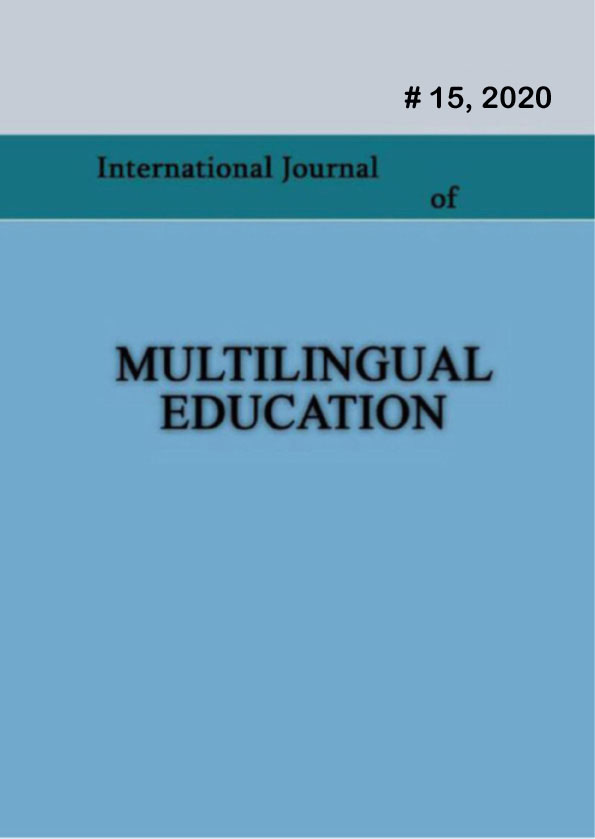A Good General Education School for the New Generation: Illusion or Reality
Keywords:
General Educations, New Generation, School ModelAbstract
The 21st century poses challenges to the general education school, which not only has to respond to the needs of education, culture, national and global context and others but also to focus on the new generation possessing specific features. The question arises: Can the new general education school be created for the new generation? If yes, what aspects of its development should be evaluated? The aim of the article is to highlight the aspects in the design of the good general education school creation. It studies the new generation in terms of their characteristics and the Conception of Good School (2015), which can become a map
designing the school for the new generation. Highlighting the essence of this conception, it is emphasised that “The Good School is the one that is built on underlying humanistic values, strives for the success of discovery and personal development, and follows the school community's agreements and learning in its activities“(Geros mokyklos koncepcija, 2015: p.1). The possible school models can also be analysed. Undoubtedly, the school model can be different, linking formal and non-formal education, the real and virtual environments. Moreover, it is possible to construct various activities on the basis of community agreements, to employ various forms, methods and ways of education, even to modify the curriculum but it is even more important to ensure the child-centred
education, which allows responding to children's needs and interests and observing their compatibility with those of society. The gap between the real and the virtual spaces should be avoided and their possibilities and potential for improvement of children's education should be fully used
References
Diržytė et al, 2016 - Diržytė, A., Mikulėnaitė, L., Kalvaitis, A. Autizmo sutrikimų turinčių vaikų situacija ir į švietimo sistemą galimybės [accessed 08 04 2019]. Available online at: https://duomenys.ugdome.lt/saugykla/Metodine_medziaga/2017/Dalykai/ Specialioji_pedagogika/Analize_201612.pdf
Falschlehner, 2014 - Falschlehner, G. Die Digitale generation. Jugendliche lesen anders. Wiena: Verlag Carl Ueberreuter. 2014.
Jandrić et al, 2018 - Jandrić, P., Knox, J., Besley, T., Ryberg, T., Suoranta, J., & Hayes, S. Postdigital Science and Education.
Educational Philosophy and Theory, 50 (10), 2018; doi:10.1080/00131857.2018.1454000 [Taylor & Francis Online], [Web of Science ®], [Google Scholar]Geros mokyklos koncepcija, approved by the Minister of Education and Science of RL, 21 December 2015, No. V-1308 Vilnius. Available online at: https://www.e-tar.lt/portal/lt/legalAct/f2f65120a 7bb11e5be7fbe3f919a1ebe
Kukla, 2000 - Kukla, A. Social Constructivism and the Philosophy of Science. New York: Routledge, 2000
Lombina & Yurchenko, 2018 - Lombina,T., Yurchenko, O. “Особенности обучения детей с клиповым мышлением“ // Общество: социология, психология, педагогика. 2018.
№ 1, 45-50. DOI: https://doi.org/10.24158/spp.2018.1.7
McCrindle & Wolfinger, 2010 - McCrindle, M., Wolfinger, E. The ABC of XYZ: Understanding the Global Generation. Australia: University of New South Wales Press Ltd. 2010.
Newby, 2005 - Newby, M. Looking to the Future. Journal of Education for Teaching, 31(4), 253–261, 2005
OECD, 2018 - The Future of Education and Skills. Education 2030. Available online at: https://www.oecd.org/education/2030/E2030%20Position%20Paper%20(05.04.2 018).pdf
Peters & Jandric, 2019 - Peters, M.A., Jandric, P. Posthumanism, open ontologies bio – digital becoming: Response to Luciano Floridi‘s Online Manifesto, Education Philosophy Theory/Educational Philosophy and TheoryVolume 51, 2019, Issue 10, https://www.tandfonline.com/doi/full/10.1080/00131857.2018.1551835? scroll=top&needAccess=true
Schneck, 2010 - Schneck, O. Die neue Generation Y als Herausforderung für die Diversity – Strategie an Hochschulen. Reutlingen: Reutlingen University, 2010
Soldatova et al, 2013 – Солдатова, Г., Зотова, Е., Лебешева, М., Шляпников В. Интернет: возможности, компетенции, безопасность. [The Internet: Possibilities, Competences, Security] Москва: Фонд Развития Интернет ФГАУ «Федеральный институт развития образования» Министерства образования и науки РФ Факультет психологии МГУ имени М.В. Ломоносова, 2013
Scholz, 2013 - Scholz, Chr. Generation Z: Willkommen in der Arbeitswelt.-[Available online at: http://download.sap.com/germany/download.epd?context=15CBA4EB14F95426 F543A9AFDAC5A08074271854ABCEA849F751EBD4813127056BC5C350BE08 3373D1BADEEC6CDCA5C60818EA003CF85895 [accessed: 30 05 2014]
Smith & Nichols, 2015 - Smith, T. J., Nichols, T. Understanding the Millennial Generation// Journal of Business Diversity Vol. 15(1) 2015 https://www.researchgate.net/publication/324922926_Understanding_the_Mill ennial_Generation
Targamadzė, 2010 - Targamadzė, V. Alternatyvi bendrojo lavinimo mokykla: mokyklos naratyvo kontūrai. Vilnius: Vilniaus universiteto leidykla, 2010
Targamadzė et al, 2015 - Targamadzė V., Girdzijauskienė, S. et all. [Scientific study].
Naujoji (Z) karta, 2015 – prarastoji ar dar neatrastoji?: naujosios (Z) kartos vaiko mokymosi procesų esminių aspektų identifikavimas. – Šiauliai: Titnagas. – P. 7– 26, – 120 p. – ISBN 978-9955-613-91-6.
Targamadzė, 2019 (1) - Targamadzė, V. Z kartos (13-14 m.) modus vivendi Z kartos mokytojų požiūriu [manuscript]
Targamadzė, 2019 (2) -Targamadzė, V. General Education School: Process of Eutrophication.Socialinis ugdymas Socialinės klasterizacijos prielaidos / Assumptions of Social Clustering 2019, Vol. 51, No. 2. Kaunas: Vytauto Didžiojo universitetas, 2019.
Published
How to Cite
Issue
Section
License
Copyright (c) 2020 Vilija Targamadzė, Mariam Manjgaladze

This work is licensed under a Creative Commons Attribution-NonCommercial 4.0 International License.
Copyright (c) - Authors who publish with this journal agree to the following terms: Authors retain copyright and grant the journal the right of first publication with the work simultaneously licensed under a Creative Commons Attribution-Noncommercial 4.0 International License, which allows others to share the work with an acknowledgement of the work's authorship and initial publication in this journal. Authors are permitted and encouraged to post their work online (e.g., in institutional repositories or on their personal website) prior to and during the submission process, as it can lead to productive exchanges, as well as earlier and greater citation of published work (see The Effect of Open Access). Authors may enter into separate, additional contractual arrangements for the non-exclusive distribution of the journal's published version of the work (e.g., post it to a repository or publish it in a book), with an acknowledgement of its initial publication in this journal.

